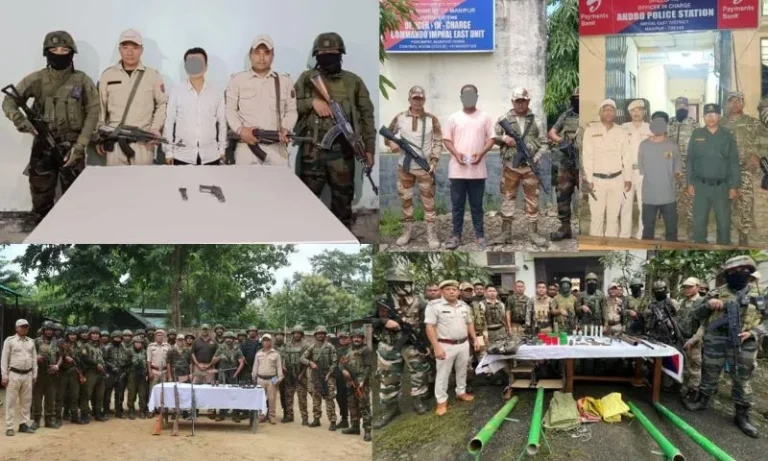Manipur Security Forces Destroy 10 Acres of Illegal Poppy Cultivation in Tamenglong District: A Bold Stand Against Illicit Activities
Summary
In a decisive operation against illicit drug cultivation, Manipur security forces have successfully destroyed 10 acres of illegal poppy fields in the Tamenglong district. This bold move, aimed at curbing the menace of narcotics and restoring peace in the region, highlights the commitment of local authorities to protect communities and uphold the law. The operation not only disrupts illegal trade networks but also sets a strong precedent for future anti-drug efforts in this sensitive border area.
Long Article
Introduction
Ever wondered what it takes to dismantle an illegal empire hidden in plain sight? Picture this: vast fields cultivated not for food or beauty, but for a crop that fuels dangerous underground markets. In the rugged terrains of Tamenglong district, Manipur, security forces have taken a giant leap in their fight against illegal drug cultivation by destroying 10 acres of poppy fields. This isn’t just about removing unwanted plants—it’s a bold declaration that law and order will prevail, even in the most challenging environments.
When news like this breaks, it stirs up a mix of relief, curiosity, and a fair share of questions. How did such an operation come to be? What does it mean for the local community and the wider region? And more importantly, how does this step fit into the broader fight against illegal narcotics in India? Let’s dive into the details and explore the ripple effects of this significant operation.
The Background: Poppy Cultivation in Manipur
Poppy cultivation, though historically known for its medicinal properties, has a darker side when it enters the realm of illegality. In many parts of the world, including some remote areas of India, illegal poppy farming has emerged as a lucrative yet dangerous business. In Manipur, particularly in the Tamenglong district, the cultivation of poppy for non-medical use has been a persistent challenge for law enforcement agencies.
Understanding the Poppy Plant
For the uninitiated, poppy plants can be a double-edged sword. On one side, they have been used for centuries to produce opium for pain relief and medical purposes. On the other, the same opium can be processed into narcotics that fuel addiction and criminal enterprises. Illegal poppy cultivation, therefore, isn’t merely an agricultural issue—it’s a multifaceted problem that touches on public health, law enforcement, and even international crime.
Why Tamenglong District?
Tamenglong district, with its undulating hills and dense forests, offers a secluded environment ideal for covert operations. Its rugged terrain and remote location have, unfortunately, made it a hotspot for illegal activities, including the cultivation of narcotic crops. In regions like this, law enforcement faces unique challenges—from navigating difficult landscapes to battling deeply entrenched local networks that thrive on secrecy.
The Operation: A Closer Look
So, what exactly happened on the day the security forces decided to take a stand? Let’s break down the operation step by step.
Intelligence and Planning
Every successful operation begins with solid intelligence. Local informants, coupled with aerial reconnaissance and on-ground surveillance, provided critical leads about the exact locations of the poppy fields. Think of it as assembling pieces of a complex puzzle—the intelligence gathered painted a clear picture of an illegal network at work.
Once the data was collated, security strategists laid out a meticulous plan. They mapped the region, identified potential escape routes for the cultivators, and ensured that every team member knew their role. This level of preparation is akin to planning a major road trip where every detour, every potential obstacle, is accounted for.
Execution: Precision in Action
On the day of the operation, the security forces moved with the precision of a well-oiled machine. In a coordinated effort that can only be described as surgical, teams were deployed to the identified poppy fields. With every step calculated, they began dismantling the illegal cultivation, ensuring that the entire 10-acre area was neutralized.
Imagine a skilled gardener who not only removes weeds but ensures they never grow back—this is exactly what the security teams achieved. They not only uprooted the plants but also destroyed any infrastructure that could support future cultivation. This wasn’t a haphazard clearing; it was a determined, systematic eradication of an illegal enterprise.
Challenges Faced During the Operation
No operation is without its challenges. The rugged terrain of Tamenglong demanded that the teams navigate steep slopes and dense foliage. Moreover, the possibility of hostile elements in the area meant that the security forces had to maintain high vigilance throughout the operation. Despite these obstacles, their resolve never wavered, and their efforts culminated in a resounding success.
The Role of Manipur Security Forces
It’s important to appreciate the sheer determination and professionalism of the Manipur security forces. Often, their work goes unnoticed until moments like these capture public attention. Their mission is not just about enforcing the law but also about safeguarding communities, ensuring that illegal activities do not take root.
Training and Dedication
These forces undergo rigorous training, equipping them with the skills needed to handle operations in some of the country’s most challenging terrains. Their dedication is not just a professional duty—it’s a commitment to the safety and well-being of the people they serve. Every successful operation reinforces their status as the first line of defense against criminal activities.
A Signal to Wrongdoers
By destroying 10 acres of illegal poppy cultivation, the security forces have sent a strong message to those involved in narcotics trade. It’s as if a guardian has drawn a line in the sand, saying, “We see you, and we will not allow your activities to harm our community.” Such actions are not only deterrents but also serve as a rallying cry for continued vigilance and collective responsibility.
Impact on the Local Community
The destruction of illegal poppy fields has far-reaching implications for the local community, affecting everything from public health to economic stability.
Restoring Safety and Order
For the residents of Tamenglong district, the presence of illegal poppy cultivation has long been a source of unease. These fields often become breeding grounds for criminal activity, attracting elements that disrupt community life. With their eradication, locals can breathe a little easier, knowing that a significant threat has been removed from their doorstep.
Economic and Social Upliftment
While the immediate focus is on law enforcement, there’s also an economic dimension to consider. Illegal cultivation often preys on vulnerable farmers who, lured by the promise of quick money, may find themselves entangled in dangerous operations. By eliminating these illegal crops, there is an opportunity to introduce sustainable, legal alternatives that can help uplift the local economy. It’s like clearing a cluttered path to make way for a well-tended garden—a future where legitimate agriculture can thrive.
Health and Environmental Benefits
Illegal poppy cultivation isn’t just a law enforcement issue; it also has significant health and environmental implications. The chemicals used in processing poppies and the subsequent drug production can contaminate the soil and water, posing serious health risks to local populations. By eradicating these fields, the operation also contributes to the restoration of a healthier ecosystem, ensuring that the environment is safeguarded for future generations.
Legal and Policy Implications
The operation in Tamenglong is not an isolated event; it fits into a broader strategy by the government to combat illegal drug cultivation and trafficking across the country.
A Step Towards Stronger Laws
Government policies and legal frameworks have long been geared towards cracking down on illegal narcotics. The successful destruction of these poppy fields reinforces the effectiveness of existing laws and the commitment of the state to enforce them. It’s a tangible reminder that when the law is upheld, even the most deeply entrenched illegal operations can be dismantled.
Policy Reforms and Future Strategies
Incidents like these often serve as catalysts for policy reforms. Lawmakers may use this success as a stepping stone to introduce stricter measures and more comprehensive monitoring systems. The operation could lead to increased funding for surveillance technologies, better training for local security forces, and more robust community engagement initiatives aimed at preventing illegal cultivation from taking root in the first place.
Challenges in Eradicating Illegal Cultivation
Despite the success of this operation, eradicating illegal poppy cultivation is an ongoing battle. Several challenges remain that need continuous attention.
Economic Pressures on Farmers
One of the major reasons why illegal poppy cultivation persists is economic hardship. In remote areas like Tamenglong, many farmers struggle to make ends meet. The promise of quick financial gain from cultivating poppies can be tempting. Addressing this issue requires not just law enforcement but also economic interventions that provide viable alternatives. Think of it as replacing an old, leaky boat with a sturdy, new vessel—farmers need support to transition to legal and sustainable crops.
Corruption and Local Networks
In some cases, local corruption can complicate anti-drug operations. When illegal activities are intertwined with local power structures, dismantling them becomes a more complex task. Continuous efforts are needed to ensure that law enforcement remains impartial and that any collusion is swiftly addressed. The fight against illegal cultivation is as much about rooting out corruption as it is about removing the plants themselves.
Geographical and Logistical Hurdles
Tamenglong’s rugged terrain poses significant logistical challenges. Conducting operations in such areas requires advanced planning, specialized equipment, and, above all, resilience. These obstacles, however, have not deterred the security forces. Instead, they serve as a reminder of the dedication required to maintain law and order in every nook and cranny of the state.
Community Engagement and Awareness
While government action is crucial, lasting change often begins with community engagement. Educating local residents about the dangers of illegal drug cultivation and involving them in the fight against it can have transformative effects.
Empowering Local Communities
Community-based programs that educate farmers about the benefits of legal crops can help reduce the allure of illegal poppy cultivation. When communities are informed and empowered, they become active participants in safeguarding their own futures. This grassroots approach is like planting seeds of change that can grow into a forest of sustainable practices.
Collaborative Efforts for a Safer Future
In many ways, the destruction of the poppy fields is only the first step. Moving forward, a collaborative effort between law enforcement, government agencies, and local communities will be vital. Regular workshops, transparent communication channels, and support for alternative livelihoods can ensure that the region moves towards a safer, more prosperous future.
Environmental Considerations
Beyond the immediate social and economic impacts, the environmental benefits of eradicating illegal poppy cultivation are significant. Pesticides and chemicals used in illegal drug processing can have a lasting impact on the local ecosystem. Removing these fields not only curbs illegal activities but also restores the natural balance of the land, ensuring that future generations inherit a cleaner, healthier environment.
The Broader National Perspective
This operation in Tamenglong is a microcosm of a much larger battle being fought across India against illegal narcotics. Similar operations in other regions have set a precedent for a zero-tolerance policy towards illicit drug cultivation. Each successful operation builds a stronger foundation for national security and public health, reinforcing the message that no illegal activity will go unchecked.
Impact on National Drug Policies
The success of such operations influences national drug policies, driving home the point that coordinated efforts between various government agencies can produce tangible results. This collaborative model—where intelligence, local knowledge, and rigorous execution come together—can serve as an example for similar initiatives across the country.
Strengthening Law Enforcement Agencies
Moreover, operations like these help boost the morale and capabilities of law enforcement agencies. They underscore the importance of well-trained security forces who can operate effectively even in the most challenging terrains. The destruction of these 10 acres is not just a win on paper—it’s a win for the entire community and a testament to the resolve of those who work tirelessly to maintain peace.
Lessons Learned and Future Directions
What can we learn from this impressive operation, and what does it mean for the future?
Continuous Vigilance is Key
First and foremost, the operation reminds us that continuous vigilance is essential. Criminal networks are adaptive, and constant monitoring is necessary to stay one step ahead. It’s like tending a garden—regular care and attention prevent unwanted weeds from overtaking the space.
The Importance of Interagency Collaboration
The successful dismantling of the illegal poppy cultivation in Tamenglong underscores the importance of collaboration. When intelligence agencies, local law enforcement, and community leaders work together, even the most challenging problems can be solved. This holistic approach is the cornerstone of effective governance.
Need for Economic Alternatives
Providing economic alternatives to vulnerable communities is another key takeaway. Empowering local farmers with the knowledge and resources to switch to legal crops will not only reduce illegal cultivation but also promote sustainable development in the region.
A Model for Future Operations
Finally, the meticulous planning and execution of this operation can serve as a model for future interventions. It demonstrates that with the right strategy and community involvement, even deeply rooted illegal activities can be uprooted. The lessons learned here will undoubtedly inform future policies and operations across other regions facing similar challenges.
Conclusion
In a world where illegal activities often hide in the shadows, the recent operation by Manipur security forces stands as a beacon of hope and determination. By destroying 10 acres of illegal poppy cultivation in Tamenglong district, the authorities have sent a clear message: unlawful practices, no matter how entrenched, will not be tolerated.
This operation is more than just a tactical victory; it’s a symbol of the unwavering commitment to protecting communities, preserving the environment, and ensuring that every citizen can live in a safe, secure society. The success achieved here is a testament to the power of preparation, collaboration, and the sheer will to enforce the law.
As we look to the future, let’s remember that every step taken against illegal activities paves the way for a brighter, more secure tomorrow. It’s not just about eradicating an illicit crop—it’s about cultivating trust, fostering sustainable growth, and building a community where hope and safety flourish side by side.
FAQs
- What led to the destruction of the 10 acres of illegal poppy cultivation in Tamenglong district?
The operation was driven by robust intelligence and a strategic plan by Manipur security forces to dismantle an illegal network that was fostering the cultivation of poppy for narcotic production. - How did the security forces conduct the operation?
The teams meticulously gathered intelligence, planned every move, and executed the operation with precision, navigating the rugged terrain of Tamenglong to clear the illegal cultivation comprehensively. - What impact does this operation have on local communities?
By eradicating the illegal poppy fields, the operation enhances public safety, helps restore environmental balance, and opens up opportunities for introducing sustainable agricultural practices among local farmers. - How does this operation fit into the broader strategy against illegal drug cultivation in India?
This move is part of a larger, coordinated effort by law enforcement agencies to combat narcotics by dismantling illegal operations, reinforcing national drug policies, and serving as a model for similar interventions in other regions. - What future measures might be taken to prevent illegal cultivation in the region?
Future measures could include continuous surveillance, interagency collaboration, economic support for legal crop alternatives, and policy reforms aimed at strengthening the overall framework against illicit drug cultivation.


